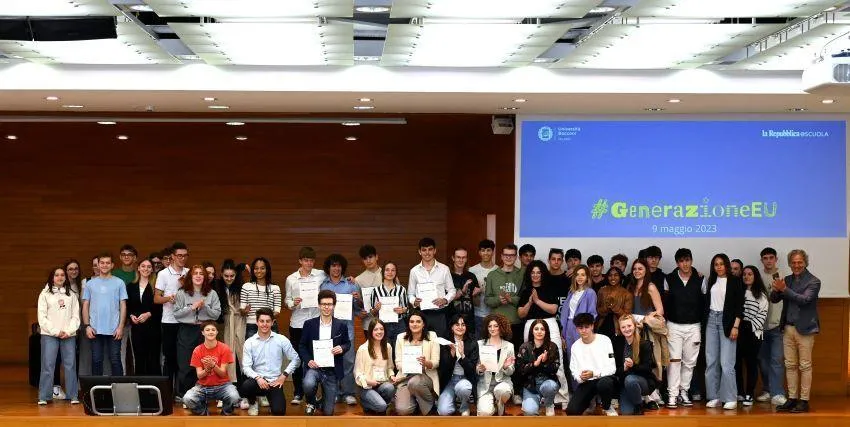
#GenerazioneEU: The Final Event in Celebration of Europe Day
"The European Union will never really come to an end; there will always be work in progress, just as with Bocconi University. Founded 120 years ago, Bocconi today remains a sort of 'unfinished product', as will probably be the case also in the next 120 years – similar to, at heart, the quintessential Milanese symbol, the Duomo." With this message, Bocconi University Rector, Francesco Billari, opened the final day of the #GenerazioneEU 2023 project, which took place on Tuesday 9 May, Europe Day, in the Gobbi Aula Magna at Bocconi. Organized by Bocconi University, the project was funded by the Achille e Giulia Boroli Chair in European Studies, together with Repubblica@scuola, with the technical support of the WeDebate Network with the national leader Enrico Tosi ITE school in Busto Arsizio and in collaboration with the European Commission's Italian Representation and the European Parliament Office in Italy.
The third annual project, the Rector recalled, "is based on a formula, the debate, which is very important because it helps one to reason and share conclusions while veering off the subject, that is, outside the defined agendas." During the initial stages, this year's event involved over 1,000 high school students from all over Italy who, after a debate training course and some meetings on issues facing Europe, squared off in a tournament that saw a first group stage and second knockout stage.
The event, which also featured a mock debate between the two finalist teams on the sensitive topic of energy dependence on Russian gas, was attended by Gianmarco Ottaviano (Boroli Chair in European Studies, Bocconi University); Carlo Altomonte (Professor of European Integration, Bocconi University); Graziella Romeo (Professor of Citizenship and Migration Law, Bocconi University); Eleanor Spaventa (Professor of European Union Law, Bocconi University); Francesco Spada (Head of Institutional Relations, Representation in Italy of the European Parliament); Claudia Colla (Head of the European Commission's Representation in Milan); Matteo Fornara (Head of Institutional Relations, JRC Ispra European Commission); and Maria Giovanna Colombo (Director of the Polo School of the WeDebate Network – Enrico Tosi ITE).
At the end of the mock debate, Andrea Boroli, Vice President of the Fondazione Achille e Giulia Boroli, awarded the finalist teams and individual prize winners. The winning team was the Ipazia Debate Club, composed of students in their fourth and fifth year at Liceo Scientifico Statale Benedetto Rosetti of San Benedetto del Tronto (Greta Bajrami, Matteo Oliveri, Stefano Albini, Giacomo Maria Veccia and Carlo Perosa), which competed in a demonstration challenge on the main hall stage with the second-place team, the Morrasinisgalli of Isis Leonardo Sinisgalli of Senise, composed of Caterina Rossi, Mariangela Bellusci and Sveva Ricciardi.
"Participating in a competition of this type forces you to inform yourself and see things from various points of view," says Matteo Oliveri, "maybe even having you reconsider your initial beliefs. It also helps you to defend your arguments decisively in front of an audience or in a debate."
"As a representative at my school," says Stefano Albini, "this experience proved to be a useful exercise right from the start, even in this role, because debating helps to improve one's dialectical skills. That's not all, though. During the preparatory stage we carried out other very interesting tasks; for example, outlining strategies, confirming the order of speakers and dividing roles according to aptitude. It's an experience we recommend to everyone."